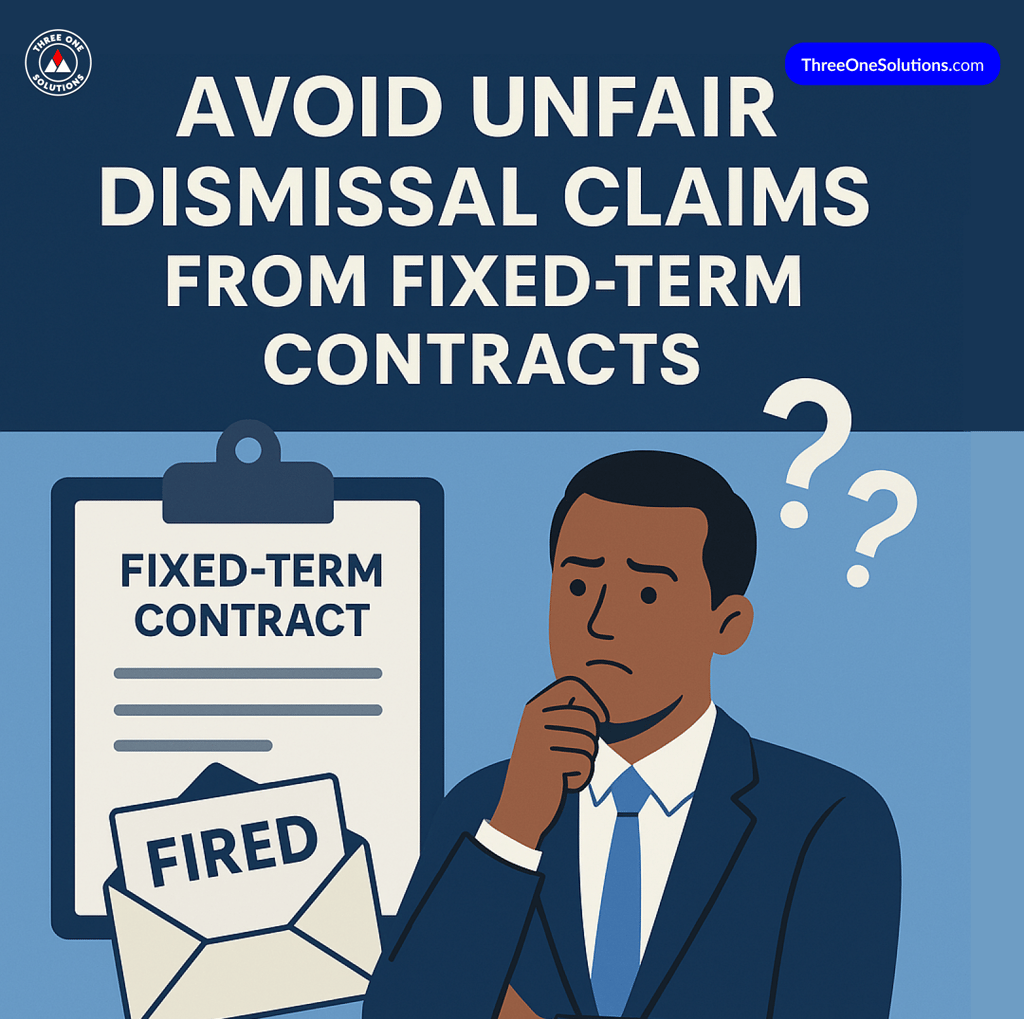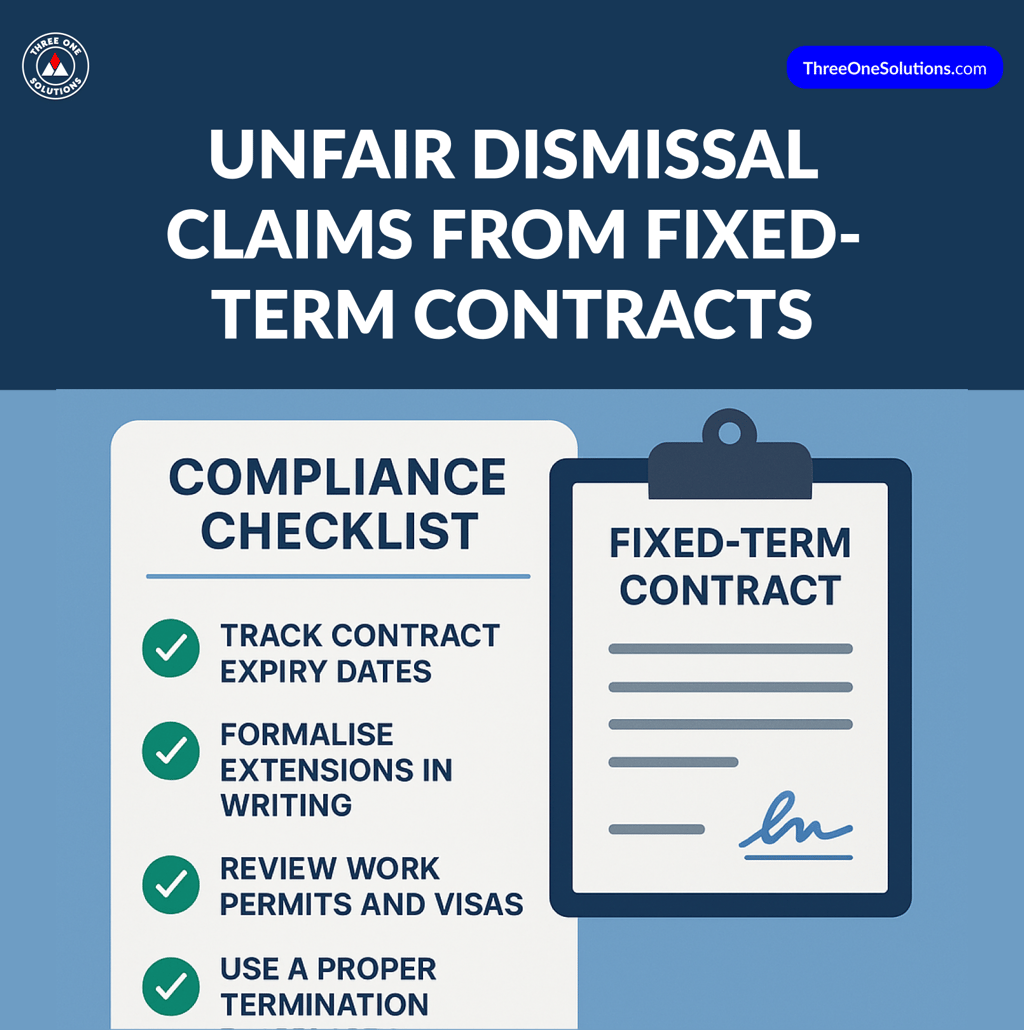Avoid Unfair Dismissal Claims on Fixed-Term Contracts
Learn how to stop unfair dismissal claims from fixed-term contracts. Stay 100% MIBCO compliant. Protect your business from fines, disputes, and legal trouble.
INDUSTRY INSIGHTSLABOUR LAW COMPLIANCE
Elleck Mgiba
6/25/20255 min read
If you hire people on fixed-term contracts, especially foreign workers, this is for you. What happened in the case of Nyakudya v OR Tambo District Municipality is a wake-up call. You can read the judgment here.
This court ruling affects more than one person or place. It matters to every boss in South Africa, especially in the motor industry. Why? Many businesses break labour laws without knowing it. This happens a lot with firing staff, ending contracts, or hiring foreign workers.
In this article, we show you what happened, why it matters, and how to avoid making the same costly mistakes.
Let's dive in.
The Case in Simple Terms: What Happened?
Mr. Nyakudya is from Zimbabwe. He worked at OR Tambo District Municipality on a fixed-term contract. When the contract ended, the Municipality let him keep working. They gave him no new contract. They didn’t extend the old one either.
Later, they terminated his employment, citing two reasons:
His work visa had expired.
His fixed-term contract had come to an end.
Seems straightforward, right? Well, not exactly.
The court said the Municipality made a new contract without saying it. They let Mr. Nyakudya keep working after the old one ended. So, when they fired him, it was unfair and against the law.
In other words, their actions spoke louder than paperwork. So, his dismissal is unlawful and an unfair labour practice (Labour Relations Act).
Why This Should Matter to You
When an employee’s contract ends, and you let them keep working, you make a new contract—without meaning to. You may let them stay because they help, you trust them, or you're busy. But this can break the law.
Worse, it can lead to:
A DRC case
A CCMA case
A court claim
A fine or payout
A bad name (you could lose your letter of good standing)
This is serious. The law protects workers. Courts care about what you do, not what you meant. Are you breaking labour law without knowing it?
Want to Avoid This Happening at Your Business?
If you hire short-term, fixed-term, or foreign workers, one small mistake can land you at the CCMA.
✅ We’ll review your current contracts
✅ Check if you're compliant legal wise
✅ Give you clear next steps to stay safe
📞 Book a Free 30-Minute Discovery Call (No risk. No obligation. Only clarity).


3 Key Lessons from the Nyakudya Case
1. Continuing Work = A New Contract
Let’s say a mechanic, service advisor, or admin assistant gets hired on a six-month contract. It ends, but they keep working with your verbal permission. That creates an implied contract.
This means:
You must now treat them as a permanent or extended employee.
Termination requires notice, valid reason, and fair process.
2. Work Visa Status Does Not Nullify Labour Rights
Even if an employee is a foreign national without valid documentation—you are still responsible for following due process.
The court made it clear: Immigration issues are separate from labour rights.
This doesn’t mean you should ignore visa compliance. But you can’t use it as the only excuse for unfair dismissal.
3. You Must Follow Fair Procedures No Matter What
Unfair dismissal doesn’t mean firing someone without a reason. It also includes:
Not giving proper notice
Skipping disciplinary hearings
Relying on expired paperwork
The courts are not interested in excuses. They want to see that you followed the right process. And if you didn’t? You lose.
Why This Is Especially Important for the Motor Industry
We help companies in the motor industry with MIBCO Compliance. The same problems pop up again and again:
Short-term contracts are common ("Let’s see if they’re a good fit")
Workers stay on longer than the contract states
Employers assume they can end things lowkey when business slows down
But here’s the truth:
If a person keeps working after their contract ends, you create a permanent job. You can’t fire them without risks.
This is where many motor industry employers get burned. You think you’re doing someone a favour by letting them stay. But legal wise, you’ve entered into a new obligation.


What Should You Do Instead? (Step-by-Step)
Here’s what every employer in the motor industry (and beyond) should be doing to stay compliant:
Track Contract Expiry Dates
Don’t leave it to chance. Use a digital system. Calendar reminder, or HR tool to notify you 30 days before any fixed-term contract ends.
Formalise Extensions in Writing
If you want someone to stay longer, give them a new written contract or letter of extension. Don’t let them keep showing up.
Review Work Permits and Visas Often
If you hire foreign nationals, set up a compliance checklist:
When does their visa expire?
Is it valid for the role?
What is your legal obligation if it lapses?
And most important of all: If a visa expires, don’t dismiss the person. Follow both immigration and labour law protocols. Refer to the Department of Home Affairs Immigration Services for details.
Use a Proper Termination Procedure
Even if someone is temporary, foreign, or underperforming, you need to:
Provide written notice
Give them a hearing
Document the reasons
Allow them to respond
If you’re unsure? Get expert help first.


How Three One Solutions Can Help You Stay Safe
We help employers in the motor industry avoid exactly these types of legal pitfalls. Our MIBCO Compliance services ensure:
Your contracts are airtight.
Your termination processes are fair.
Your foreign employee management is legal.
Your business stays out of labour court.
Whether you want to do it yourself, do it with us, or let us handle it for you — we have a solution for you.
Final Thoughts: Don’t Wait Until You’re in Court
The worst time to learn about unfair dismissal is when you sit across from a labour commissioner. The second worst time? When the sheriff knocks with a summons.
Get ahead of the problem. Treat every fixed-term contract with care. Respect visa compliance. And always, always follow fair procedure. For employer guidelines, visit the Department of Employment and Labour.
Need a compliance check? We’re a phone call, email, or WhatsApp away.
📢 Book a Free 30-Minute Discovery Call to see if your business is at risk. Labour law doesn’t care what you meant to do. It only cares what you actually did. Let’s help you do the right thing, the right way.
About the Author
Elleck Mgiba is the founder of Three One Solutions. He has over 20 years of experience in South Africa’s motor industry. Elleck is a trusted expert in labour law and MIBCO compliance. He helps employers avoid CCMA disputes, pass inspections, and build fair, legal workplaces.
Frequently Asked Questions
Q1: What is the Nyakudya v OR Tambo case about?
A Zimbabwean employee continued working after his contract expired. The court ruled this created a new contract, making his dismissal unlawful.
Q2: Can an expired work visa justify dismissal?
No. Employers must follow fair labour procedures even if the worker’s visa has lapsed. Immigration and labour law are separate.
Q3: What is an implied contract in labour law?
An implied contract forms when an employee keeps working after the contract ends. And the employer lets it happen without objection.
Q4: How do I avoid unfair dismissal claims?
Track contract ends dates. Renew contracts in writing. Follow fair procedures. Ask a MIBCO Compliance expert for help. For official guidance, see the CCMA’s Guide to Unfair Dismissal.


We are the solution you've been looking for, not the one you've been stuck with.
MIBCO Compliance Solutions
The Company
Articles
Affiliate Program
Referral Program
MIBCO Minimum Wage 2024/2025 Update: New 3-Year Deal (2025–2028)
Three One Solutions is a Compliance Management Company for South Africa's Motor Industry. Our vision is to see SA without unhappy employers and employees in the Motor Industry. Our mission is to make life better for employers and employees in SA's Motor Industry. We give people confidence, knowledge, and solutions to stay MIBCO compliant. Want to make sure your business or the one you work for is MIBCO compliant? You're in the right place.
Copyright © 2025 EM Mgiba Investments (Pty) Ltd Registration No. 2015/256789/07 T/A Three One Solutions. All Rights Reserved. Marketing by Cleymand.com
What Customers Say
Careers
Shop Our HR Templates
Case Studies


